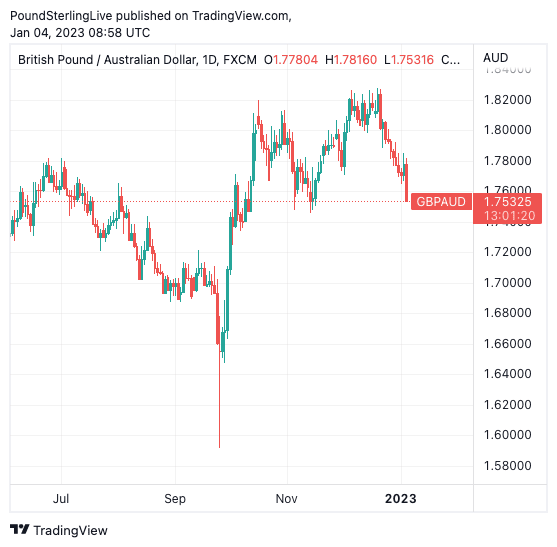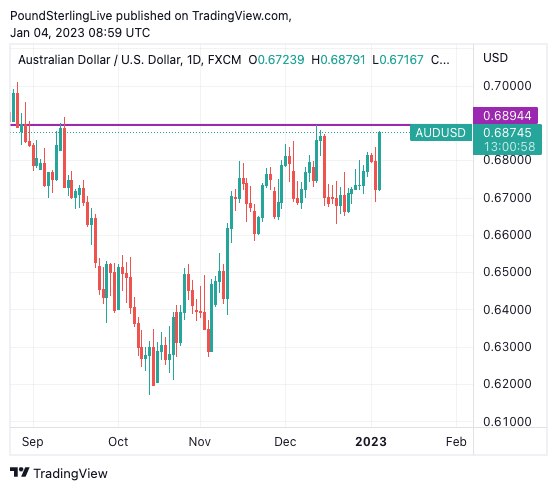Australian Dollar Reigns as China Readies to Overturn Coal Ban
- Written by: Gary Howes

Image © Adobe Images
The Australian Dollar surged higher following news China was considering lifting a coal import, confirming the currency's close ties to developments out of China.
The Pound to Australian Dollar exchange rate (GBP/AUD) fell by over a percent in midweek trade after reports emerged that Chinese authorities are discussing plans to resume some imports of Australian coal.
"AUD reigned at the top of the G10 complex, boosted by Chinese prospects as well as discussion by China authorities regarding a partial end to the Australia coal ban," says Rui Ding, an analyst at Citi.
A Bloomberg news report said the National Development and Reform Commission held talks Tuesday on proposals to allow four major importers — China Baowu Steel Group Corp., China Datang Corp., China Huaneng Group Co. and China Energy Investment Corp. — to make new purchases from Australia this year.
Above: GBP/AUD at daily intervals. Consider setting a free FX rate alert here to better time your payment requirements.
Australia is highly reliant on Chinese demand for its industrial output and continues to post strong trade surpluses on the back of its coal, iron ore and natural gas exports.
This dynamic continues to prove a long-term fundamental source of support for the Australian economy and its Dollar.
"The country is the second largest exporter globally after Indonesia. The 30-day rolling correlation of AUD/USD and coal is insignificant (-0.27), but rising volumes at higher prices should help to swell the trade surplus," says Kenneth Broux, an analyst at Société Générale.
Compare GBP to AUD Exchange Rates
Find out how much you could save on your pound to Australian dollar transfer
Potential saving vs high street banks:
A$4,875.00
Free • No obligation • Takes 2 minutes
"AUD extends initial gains as a China proxy," says Ding. "However, we note that this isn’t the first time we have seen similar reports, which suggests some caution against chasing the move."
But according to the news report, Chinese imports of Australian coal could resume as soon as April 1.
GBP/AUD is now at 1.7534, its lowest level since November, taking bank transfer rates to approximately 1.7080, cash and holiday money rates at competitive providers to around 1.7414 and rates at competitive money transfer providers to around 1.751.
AUD/USD is meanwhile nearly 2.0% higher on the day at 0.68637, ensuring it is now testing a key line of resistance, which if broken could result in a more enduring trend of Aussie Dollar strength:
Above: AUD/USD at daily intervals, showing the approach to a key line of resistance. If you are looking to protect or boost your international payment budget you could consider securing today's rate for use in the future, or set an order for your ideal rate when it is achieved, more information can be found here.
China implemented an unofficial ban on Australian coal in late 2020 as political hostilities between Canberra and Beijing escalated over issues including a call for an independent probe into the origins of the coronavirus.
The developments however reflect Chinese concerns over the country's energy security with officials keen to ensure power supplies are guaranteed over the coming months.
"Bureaucrats have been aiming to prevent any repeat of widespread power shortages in 2021 and more limited outages late last year. There are also concerns that European-led restrictions on Russian energy could boost competition for coal from China’s key suppliers like Indonesia," reports Reuters.
The coal market developments come as China commits to fully reopening its economy after authorities conceded in late 2022 its zero-covid policy was no longer feasible.
A strong economic rebound in China over the course of 2023 would lift the global economy and boost China-focused currencies, such as the Aussie Dollar.
"Within the space of commodity FX, we prefer the Australian dollar," says Claudio Wewel, FX Strategist at Bank J. Safra Sarasin.
"Given Australia’s exposure to the Chinese economy, its currency should be the primary beneficiary of a lifting of Chinese COVID restrictions," he adds.
Compare GBP to AUD Exchange Rates
Find out how much you could save on your pound to Australian dollar transfer
Potential saving vs high street banks:
A$4,875.00
Free • No obligation • Takes 2 minutes






